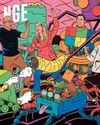
THE FUTURE OF the metaverse looks shakier than ever. Tech companies that have gone all in on the concept, like Meta, are faced with building out a platform that ostensibly already exists but has failed to achieve any real popularity. Even the video game industry, which has been exploring the idea through virtual worlds like Linden Lab's Second Life for years, has doubts that the metaverse will ever live up to its promise. But in this nascent stage, there is also potential: The people building the metaverse could avoid repeating the mistakes that are baked into most of the digital platforms we use every day.
As it stands, the metaverse is "not yet set," says Micaela Mantegna, an affiliate at Harvard's Berkman Klein Center for Internet & Society, so it might still be possible to limit the rampant toxicity that has infected the web and social media. If the people and corporations populating the metaverse can remember the lessons learned about online safety and moderation, it could be an oasis, or at least a less horrible place. As Mantegna said during a panel at the Game Developers Conference in March, "we already ruined one internet"-but there's hope for the one to come.
Early metaverse experiences, like Second Life, allowed users to explore identities and build new worlds. This approach became the backbone for platforms like Roblox and VRChat, which turn devices into hubs for social interaction and community creation. More recently, as Meta and other companies have moved to transform virtual spaces like Horizon Worlds into mega-platforms, those smaller communities have felt pushed aside. There is less room for users to craft their own world; instead, they navigate the clunky, legless future manufactured by corporations.
This story is from the June 2023 edition of WIRED.
Start your 7-day Magzter GOLD free trial to access thousands of curated premium stories, and 9,000+ magazines and newspapers.
Already a subscriber ? Sign In
This story is from the June 2023 edition of WIRED.
Start your 7-day Magzter GOLD free trial to access thousands of curated premium stories, and 9,000+ magazines and newspapers.
Already a subscriber? Sign In

MOVE SLOWLY AND BUILD THINGS
EVERYTHING DEPENDS ON MICROCHIPS-WHICH MEANS TOO MUCH DEPENDS ON TAIWAN. TO REBUILD CHIP MANUFACTURING AT HOME, THE U.S. IS BETTING BIG ON AN AGING TECH GIANT. BUT AS MONEY AND COLOSSAL INFRASTRUCTURE FLOW INTO OHIO, DOES TOO MUCH DEPEND ON INTEL?

FOLLOW THAT CAR
CHASING A ROBOTAXI FOR HOURS AND HOURS IS WEIRD AND REVELATORY, AND BORING, AND JEALOUSY-INDUCING. BUT THE DRIVERLESS WORLD IS COMING FOR ALL OF US. SO GET IN AND BUCKLE UP.

REVENGE OF THE SOFTIES
FOR YEARS, PEOPLE COUNTED MICROSOFT OUT. THEN SATYA NADELLA TOOK CONTROL. AS THE COMPANY TURNS 50, IT'S MORE RELEVANT-AND SCARIER-THAN EVER.

THE NEW COLD WARRIOR
CHINA IS RACING TO UNSEAT THE UNITED STATES AS THE WORLD'S TECHNOLOGICAL SUPERPOWER

CALIFORNIA DREAMIN'
KINDRED MOTORWORKS VW BUS - Despite being German, the VW T1 Microbus is as Californian as the Grateful Dead.

THE INSIDE SCOOP ON DESSERT TECH
A lab in Denmark works to make the perfect ice cream. Bring on the fava beans?

CONFESSIONS OF A HINGE POWER DATER
BY HIS OWN estimation, JB averages about three dates a week. \"It's gonna sound wild,\" he confesses, \"but I've probably been on close to 200 dates in the last year and a half.\"

THE WATCHFUL INTELLIGENCE OF TIM COOK
APPLE INTELLIGENCE IS NOT A PLAY ON \"AI,\" THE CEO INSISTS. BUT IT IS HIS PLAY FOR RELEVANCE IN ALL AREAS, FROM EMAIL AUTO-COMPLETES TO APPS THAT SAVE LIVES.

COPYCATS (AND DOGS)
Nine years ago, a pair of freshly weaned British longhair kittens boarded a private plane in Virginia and flew to their new home in Europe.

STAR POWER
The spirit of Silicon Valley lives onat this nuclear fusion facility's insane, top-secret opening ceremony.